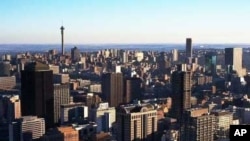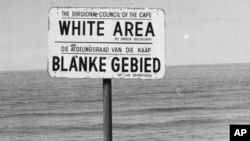Hello there, and welcome to “As It Is,” VOA’s daily show for people learning American English!
I’m Christopher Cruise in Washington.
Today on the program we hear from Anita Powell. She is VOA’s main radio and television reporter for southern Africa. She tells us about the South African city of Johannesburg, a place she considers both strange and energetic.
“The city can be crazy and hard-edged, but it has an energy that I have rarely seen anywhere else. Here in Johannesburg, anything goes, and everyone is welcome. And we like it that way.”
But first, we report on the issue of corruption in South Africa, and what officials there say they are doing about it.
Fighting Corruption in South Africa
The group Transparency International follows corruption in many countries. It recently released a report that may finally lead to real changes in South Africa.
The report says almost half of South Africans paid a bribe to an official in 2012 for a necessary service. The worldwide average is about 25 percent.
Paul Hoffman heads the Institute for Accountability in Southern Africa. He is not surprised by the finding.
“Corruption thrives when there’s an absence of public accountability, where the levels of transparency in governance are lacking and where a culture of impunity takes root. And all three of those factors are available in abundance in South Africa.”
David Lewis is the head of Corruption Watch, a non-profit organization.
“There is plenty of vulnerability in the system for those who would abuse it, to take advantage of it. And, and, you know, it’s one of the things that we’re beginning to recognize which I think makes combating corruption so difficult is that there is around every public sector resource, there are sort of interests clustered who are living off them -- sometimes living quite, you know, relatively speaking, quite elaborately off them. And, so these are, these are difficult to, to tackle.”
The South African government is answering the report with new efforts to fight corruption. Lindiwe Sisulu is the minister for public service and administration. She says the government will create a new anti-corruption agency, and her ministry will ask the legislature to approve more anti-corruption laws.
The South African Police Service announced plans to launch a new anti-corruption department within the next six months. But the Service’s Lt. General Solomon Makgale said police are not the only ones to blame.
“Some of the media reports -- well most of them -- they put a lot of emphasis on the police who are being corrupted. They forget that there is an equal responsibility on the person that is doing the corrupting.”
He does, however, admit that the police service must make changes.
“What is important for us is that corruption is a reality in South Africa, corruption is a reality within the South African Police Service, and the national commissioner has made it very clear that this needs to be dealt with by forming an anti-corruption unit that’s going to focus exclusively on addressing criminality within the South African Police Service.”
Paul Hoffman of the Institute for Accountability says the planned reforms will be effective only if they are enforced and kept separate from politics.
“They won’t persuade me that they are serious about corruption until such time as a body that is specialized, trained, independent, properly resourced, and who’s membership has security of tenure of office exists. We do not have a body that has any of those attributes.”
“You’ll Get Killed!”
South Africa’s Advertising Standards Authority has ruled that the city of Johannesburg must stop calling itself a “world-class African city.” Johannesburg has been using advertisements that describe the city as financially stable and environmentally friendly. But the independent authority says that is just not true.
In this Reporter’s Notebook, VOA’s Anita Powell tells us about life in South Africa’s biggest city and, in her opinion, possibly Africa’s strangest…
There is a fine-chocolate store in Johannesburg that carefully places large amounts of tissue paper around the sweets you buy there. Just down the road is a car dealership that sells costly Ferraris. Nearby is a private school for boys, where costs for a single year of studies start at $7,500. That is the same as the cost for three years at the University of Johannesburg.
But just a short drive north is the settlement of Diepsloot.It is known for violent attacks on foreigners, mob violence and protests by people demanding running water and electricity.
It is those conflicting worlds that troubled Steven Haywood when he heard a radio advertisement with the words “Joburg, a World-Class African City.” Mr. Haywood brought his concerns to the Advertising Standards Authority. Last month, the group ruled that he was right.
It agreed with him that records show investigators have examined local government spending three times. They agreed that the city’s waste-management company often leaves trash lying around on streets for days. And its roads agency lacks money to fix the roads.
Mr. Haywood also noted that $1.2 billion in public money is missing. This information, he said, is on the city’s own website!
Nthatisi Modingoane is a spokesman for the city of Johannesburg. He says the city will appeal the ruling. He says Johannesburg is working to become financially and environmentally strong.
“You know, whoever (is) listening might be saying because I’m biased, and because they pay my salary. But, for me it’s beyond that. We, we attract so many people coming through Johannesburg. People are rushing here -- it says there is something that is being talked about through the word of mouth in terms of how great this city is.”
Gerald Garner works for the Joburg City Tourism Association. He calls the city “one of the most exciting on the planet.”
“The city is a melting pot, it’s a very creative place -- one of the most creative cities on the planet -- and you never have a dull moment in this city.”
Johannesburg calls itself “Egoli” -- or the city of gold. But many people -- referring to the city’s high crime rate -- say the unofficial name is “the place where you’ll get killed.” A number of people in Johannesburg have said this to me.
“You want to walk through your neighborhood?” asks the woman who takes the bus to the city every day from a poor area. “Oh, no, my dear, you’ll get killed,” she warns. “You live where?” asks a friend who lives just five minutes from where I live. “You’ll get killed.”
Johannesburg is a place that fought early and hard against apartheid -- the system that separated blacks and whites. But until six years ago a main road was still named after Hendrik Verwoerd -- the man who created apartheid!
The city has an internationally-respected art and literary environment. But you can also buy dried monkey paws at a busy market, and you can find people who promise to bring back your lost lover or make parts of your body bigger. Some of them will provide this service by mobile phone.
The city can be crazy and hard-edged, but it has an energy that I have rarely seen anywhere else. Here in Johannesburg, anything goes and everyone is welcome. And we like it that way.
Is Johannesburg a world-class city? Maybe not, but its weirdness certainly is.
This is Anita Powell, VOA News, in Johannesburg.
I’m Christopher Cruise, and that’s “As It Is” on The Voice of America.









